Election 2011: AAPS Board Candidate Forum
A candidate forum held Monday evening, Oct. 3, 2011 invited six candidates for two seats on the Ann Arbor Public Schools (AAPS) board of education to make brief statements and share their answers to five questions.
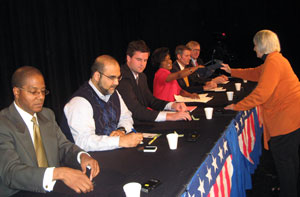
Simone Lightfoot draws a number out of the hat, held by League of Women Voters member Judy Mich, to determine speaking order. From left to right (front to back): Albert Howard, Ahmar Iqbal, Patrick Leonard, Simone Lightfoot, Larry Murphy, Andy Thomas. (Photos by the writer.)
Candidates were asked about bullying, their candidacies, technology, transportation, and partnerships between AAPS and other entities. The forum was sponsored by the local League of Women Voters, and broadcast live from the studio at Community Television Network (CTN).
The video can be re-played online through CTN’s video-on-demand service.
League member Susan Greenberg opened the forum, introducing the six school board candidates – Albert Howard, Ahmar Iqbal, Patrick Leonard, Larry Murphy, and incumbents Simone Lightfoot, and Andy Thomas.
Election Day is Nov. 8. Voters will be asked to choose up to two candidates to serve four-year terms on the seven-member board. Board members not standing for election this time around are: Deb Mexicotte, Glenn Nelson, Irene Patalan, Christine Stead and Susan Baskett.
Greenberg explained that the League of Women Voters is open to all citizens over the age of 18, male and female, and referred the public to the League website for membership information. She added that one purpose of the League is to assist voters in making informed choices at the polls, and as such, it holds forums such as this one.
Finally, Greenberg noted that the questions for Monday’s forum were selected by a committee of League members from suggestions sent in by the community, and introduced forum moderator Judy Mich.
Mich welcomed “viewers, voters, and candidates” and provided some information on how the forum would be conducted. She explained that the League’s policy is to alternate the person who first responds to a new question, and then allow each of the other candidates to respond to the same question. For the opening and closing statements, candidates drew numbers to determine their speaking order.
Candidate responses are presented in the order in which they were given. For previous Chronicle coverage of the candidates, including more about their backgrounds, see: “Forum for Six AAPS Candidates“
Opening Statements
Moderator Judy Mich invited each candidate to give a one-minute opening statement, in an order chosen at random out of a hat before the meeting.
Opening: Albert Howard
Howard said he was speaking from the heart, and that he hopes to see parents, teachers and students united in their goals. He noted that the restaurant chain McDonald’s trains people as teens to be able to understand how to work there, and that AAPS should be able to train its students effectively. Howard summarized his campaign as advocating for “transparency, safety, and spirituality.”
Opening: Larry Murphy
Murphy noted that he and his wife moved from their cottage on Whitmore Lake to Ann Arbor for the schools, and that he believes the schools are at critical crossroads. Noting that AAPS has made cuts in the number of teachers, raised class sizes, and increased the number of split classes (classes that contain students of two grade levels), Murphy argued that the district has significant problems. He asserted that he is the candidate who is offering specific solutions, and pointed voters to his website to review his “fresh ideas that can be implemented.”
Opening: Patrick Leonard
Leonard thanked the LWV and CTN for hosting this forum, and introduced himself as a product of AAPS and the University of Michigan. He said he has two family members who currently work in the district, and that he has worked for AAPS Rec & Ed for three years. Leonard credited his volunteer work with district elementary schools as inspiring him to run for the school board, saying that he was surprised at how unprepared some students were for grade-level work. His focus, he said, would be the achievement gap, along with increasing transparency and improving communication.
Opening: Andy Thomas
Thomas began by saying that it’s been a “pleasure and a privilege to serve on the board,” and that he is running for re-election because the schools face dangerous and difficult times ahead. He said that he has fought to preserve programs that make AAPS extraordinary, and listed his priorities as: creating an environment where all students can learn and experience excellent teaching; providing multiple paths to success for different students; demonstrating financial stewardship; and ensuring the district has a robust curriculum to prepare children for a rapidly changing world.
Opening: Simone Lightfoot
Lightfoot began by noting that on Nov. 8, voters will have the opportunity to select two trustees and said that she wants to be their “number one.” She pointed out that she is also a product of the AAPS, and a parent in the district, and that she understands the community – both the appeal and the challenges. She urged voters to consider the values and experience of each candidate, as well as “what has influenced [their] experiences.” Saying that she is an “independent voice” on the current school board, Lightfoot noted that she had voted no on the superintendent salary increase, as well as on the 2011-12 budget. She closed by saying that, despite differences of opinion on some issues, she does greatly enjoy working with her fellow trustees and that she would like to continue to do so.
Opening: Ahmar Iqbal
Iqbal noted that he is also a product of Michigan public schools all the way through college at the UM, and that he currently lives in northeast Ann Arbor with his wife and two children. He said he wants to see better schools, and that kids should be given the best opportunities possible. Iqbal asserted that his financial experience separates him from his colleagues and gives him a unique perspective. He pointed out that the district’s budget of approximately $185 million is more than some municipalities and universities.
Bullying
Question: The state of Michigan has yet to enact an anti-bullying law. Tell us some of what the district has in place to prevent bullying and how these policies can be improved or more effectively enforced.
Bullying: Albert Howard
Howard gave an example of action the Huron High School principal had taken in response to Howard’s complaint that he witnessed coaches swearing at players at a Huron football game. The principal had assured Howard that there are rules in place that do not tolerate such behavior, and Howard was grateful for his response. Howard urged the public to continue to “put pressure on people who can make a difference.”
Bullying: Ahmar Iqbal
Iqbal said that bullying is a “sensitive subject these days,” noting the diversity of Ann Arbor. He asserted that administration needs to be assertive and firm and to have a policy in place that discourages any form of harassment, including name-calling and cyberbullying. Iqbal added that all rules regarding bullying need to be open and fair, and that all students should have the opportunity to gain the most from their classrooms.
Bullying: Patrick Leonard
Leonard said this was a subject he was passionate about, and that he had witnessed bullying in the schools firsthand five years ago as a student at Pioneer. He would like to develop a plan with stricter sanctions for bullies, and more educational resources for teachers to help them address bullying. He agreed that bullying in athletics is a “major issue,” and said he would like to look at ways to educate coaches and athletes. Noting that the cultural diversity of AAPS makes it one of the best districts, Leonard urged the district to work toward implementing anti-bullying policies.
Bullying: Simone Lightfoot
Lightfoot said that she had experienced bullying firsthand as a parent dealing with a situation with her daughter, and that it’s important to carefully define bullying. She noted that the board has policies on bullying, and has been open to revisiting those policies to “reflect current times.” She suggested that the district should weigh in on laws and regulations being crafted at the state level, and enlist students in finding solutions. Lightfoot also agreed that sanctions and trainings are important tools to address bullying.
Bullying: Larry Murphy
Murphy asserted that bullying is underrated by the population as a whole. He explained that he asks his own children every month or so, “Are you treating your fellow classmates with respect?” just to be sure they are not the cause of bullying. Saying he would support bullying laws being put on the books, Murphy acknowledged that implementing them could be difficult.
Bullying: Andy Thomas
Thomas said he would like to share two success stories and one challenge. First, he noted that many elementary schools hold diversity celebrations as part of ongoing bullying prevention, and argued that the awareness these celebrations bring carries over into older ages. Secondly, he mentioned that last year, he had the privilege of attending Huron’s challenge day, which he described as “a marvelous opportunity for students to come to grips with issues that had been dividing them.” As a challenge the district faces in this area, Thomas pointed out that a climate survey was conducted in the district a few years ago, but the data have not been used to do anything beyond make a report to the board.
Candidacy
Question: Most voters in the school district do not have children in the schools. How can you effectively represent them as well as the causes and constituencies that have made you seek election? What skills and strengths do you bring to the position?
Candidacy: Ahmar Iqbal
Iqbal said this was a good and engaging question. Everyone in the community has a stake in its schools, he began, asserting that, “Education is a pillar and strong asset of a community.” As evidence of his skills and strengths, Iqbal noted that he has a background in environmental education consulting and finance, and is connected to many community organizations, such as Ann Arbor SPARK, the Ann Arbor-Ypsilanti Regional Chamber and other groups, which the district should engage to leverage their skills. As an example, Iqbal pointed out how AAPS can take classes in Hebrew through the Jewish Federation of Ann Arbor.
Candidacy: Patrick Leonard
Leonard said he has always had a collective vision, and realizes the importance of education even to those who do not have kids. He is the only one of the six candidates who is not an AAPS parent. He noted that board trustees are public servants, who serve everyone in Ann Arbor. Leonard argued that he has ties the community, and is actively involved in working with and engaging constituents.
Candidacy: Simone Lightfoot
Lightfoot noted that even people without students in AAPS are affected by the decisions the board makes, and pointed out that property values are key to the district’s funding. Community members, she said, have the opportunity to “weigh in with their expertise.” Lightfoot argued that her background in public policy helps her be an effective trustee, and noted that she also has military experience, which taught her to understand strategy, tactics, and goal-setting. Finally, she said that she has also had experience working in social justice – some things, she said, “impact all of us, whether we have children or not.”
Candidacy: Larry Murphy
In door-to-door canvassing, Murphy said, he has met a lot of people who say that their kids have already graduated. “And to them I say – you’re a taxpayer.” It’s not enough just to balance the books, Murphy argued. In his business, he said, he is very careful about only spending money where it is “value-added.”
Candidacy: Andy Thomas
Thomas argued that education of critical to the quality of life for people of all ages. He noted that his engagements with the community have included people of a wide variety of ages, incomes, and life experiences. Thomas said he has worked with Washtenaw Literacy, helped serve food through the Interfaith Hospitality Network, and formed the Karen Thomas Memorial Fund, a reading support program for elementary schools that engages community volunteers to work with students. This engagement with the community, and with people of all ages, Thomas argued, is necessary for the school board.
Candidacy: Albert Howard
Howard repeated his message of “transparency, safety, and spirituality.” He said he liked Iqbal’s mention of the Jewish connection, and noted that he speaks “the blessing” to his children almost every morning. Howard noted that Ann Arbor-Detroit is almost like one city, and the it’s the number one city in the nation for fatherless children. “We must instill into these children their purpose.” Howard said, “Once a child has the love of their family, nothing can stop them.”
Technology
Question: What is your evaluation of the technology level of the AAPS – plusses and shortcomings? There has been talk of a special technology millage to be put before the voters next year. As a board member, would you favor such a millage request and campaign for its passage?
Technology: Patrick Leonard
Leonard supports the tech bond. He said that everything in technology is changing, and that because of this, technology will be needed that cannot be predicted. Technology, Leonard argued, is becoming a vital component of the education system, and that in order for children to receive a stellar education, the district needs to be able to incorporate it. Other schools already have this, he said, and AAPS needs it for its students to remain competitive.
Technology: Simone Lightfoot
Lightfoot supports the tech bond. She noted the challenges, as a trustee, of being clear on the infrastructure needs of the district, as times move quicker than technology can be refreshed. At the same time, she said, board members still hear voters say they are tired of paying bonds and millages. She noted that she had benefited from great technology when she went through AAPS as a student herself, and asserted that now also “as a trustee, I know we need these things.” Still, she said, while supporting the bond, she “will also support the things the community contends we need.”
Technology: Larry Murphy
Murphy does not support the tech bond. If there were a bond to hire more teachers, Murphy said, he would support that. He questioned whether some of the improvements outlined in the technology plan are necessary, such as a four-year replacement cycle for computers, and “wiring all classrooms for audio.” He said he cannot support the bond as it’s currently been explained.
[Ed. note: Individual Michigan school districts are prohibited from soliciting dedicated funding for operational expenditures, such as teacher salaries, but are allowed to request voter funding of capital improvements, including technology improvements. Before the passage of Proposal A in 1994, individual districts were allowed to solicit funding directly for the general fund; now, any new general fund millages can only take place at the county level. AAPS is one of ten individual districts that make up the Washtenaw Intermediate School District.]
Technology: Andy Thomas
Thomas supports the tech bond. He noted that Murphy raised a reasonable question when he asked why the district is planning for laptops and other computers to have an expected life of only four years, but noted that “if you have been in a classroom and seen the way they’re used – they get a lot of wear and tear.” Thomas also pointed out that AAPS has “issues with extending the warranty,” and argued that four years is a good lifespan. Computers, he argued, offer an opportunity to better leverage the teachers the district already has by offering online classes.
Technology: Albert Howard
Howard supports the tech bond, “as long as this technology supports the child’s language.” He argued that technology can’t be something that intimidates children, but should “bring them peace.” He said he’s all for giving a teen a tangible assignment on a laptop, but that he does not want the district to get caught up in the competitiveness of technology.
Technology: Ahmar Iqbal
Iqbal does not support the tech bond, except as a last resort. He began by saying, “We all support technology,” and then listed three issues he sees with the tech bond as it’s currently laid out. First, Iqbal questioned how any technology, or any expenditure, impacts children’s ability to learn, and said the district needed to look into this more. He pointed out that the current technology plan is significantly shorter (in number of pages) than the previous technology plan, even though it earmarks a larger amount of money.
Secondly, Iqbal argued, “The issue of the tech bond is a larger, managing issue.” He likened the tech bond to a way of capitalizing operating expenses like books and paving parking lots that the district would otherwise pay for out of its general fund, and said that the tech bond would capitalize expenses until 2025 for “things that may not last that long.” Thirdly, Iqbal argued that there is a “tipping point on how much the community wants to pay.”
[Ed. Note: The tech bond, if approved by voters, would issue bonds in three series, beginning in 2012, 2015, and 2019. In each case, the expected life of the technology products to be purchased would be longer than the length of time it will take to pay off that series of bonds, which is also a legal requirement. See The Chronicle's coverage of the technology bond being considered for more details: "AAPS To Float February Tech Millage" ]
Transportation
Question: Changes in school bus service, particularly routes and placement of stops, has been a big issue this fall. Are you supportive of these budget-cutting decisions? Will it really create a net savings of $1 million? Can you suggest other resolution?
Transportation: Simone Lightfoot
Lightfoot said that AAPS does not know yet whether outsourcing transportation to the Washtenaw Intermediate School District (WISD) has saved the district money, but that the board will hear from WISD soon. Unfortunately, she said, the district has “had to move ahead and add more responsibility onto the WISD” in the meantime. Lightfoot argued that the district needs to enlist “the experts,” who she defined as parents and students, who know the neighborhoods the best. She said AAPS needs to make changes in transportation, but to do so will need to do a much better job of listening to parents.
Transportation: Larry Murphy
Murphy said he agreed with Lightfoot that transportation needs to be reworked, and that the district has to do a better job than before. He suggested using neighborhood busing, where one bus picks up all students, K-12, from the same neighborhood. Arguing that neighborhood busing is a “promising idea” that would “save a ton of money on fuel,” Murphy acknowledged that the downside is having twelfth graders and kindergartners on the same bus. Still, he said, that issue could be mitigated by using assigned seating, and would still be better than students walking in dark, icy conditions. Murphy said he has a meeting scheduled with the Dexter administrator responsible for organizing neighborhood busing in that community.
Transportation: Andy Thomas
Thomas said that on a policy level, the board did what it needed to do. He pointed out that the business of the district is to educate, not to provide transportation, and that busing is not mentioned anywhere in the strategic plan. With that said, Thomas acknowledged that the implementation of the new busing system had been difficult, and that the district had a lot of problems with the WISD, including not answering the phones and not accurately measuring distances. He said the AAPS administration is working with the WISD to address the issues.
Transportation: Albert Howard
Howard said that Thomas’ response to this question bothered him, and that the safety of children comes before the budget. “Without the children,” Howard argued, “there would be no buses.” Saying this is a sensitivity issue, Howard said the district needs to step outside the box and do what might be unusual. He argued that the outsourcing of transportation has meant that there are children who are now not going to school.
Transportation: Ahmar Iqbal
Iqbal argued that safety is the number one priority, and that AAPS does not need parents with anxiety about their children crossing busy roads or walking without sidewalks. He questioned how this problem came about, and said that parents demand accountability. “How did we cut this out of our budget?” he asked. He argued that AAPS total budget increased by $2 million from last year to this year, from $183 million to $185 million and that even with this increase, transportation was still cut.
[Ed. Note: In a phone call with The Chronicle, AAPS deputy superintendent of operations Robert Allen confirmed that the total 2010-11 AAPS budget was $185.3 million and the total 2011-12 AAPS budget was $183.62 million, a decrease of $1.68 million.]
Transportation: Patrick Leonard
Leonard said that there was poor decision making on the board’s part, and a lack of community engagement regarding busing. He asserted that parents at Arrowwood Hills, Foxfire, and Carrot Way wanted answers, “and we were not there.” Leonard pointed out that Dexter is a much smaller school district and argued that a one-tier system of busing all students together (as suggested by Murphy) would be difficult to implement in AAPS. Instead, Leonard advocated for bringing back neighborhood stops as the district has offered in the past. “We need to expand” he said, “and not function myopically.”
Partnerships
Question: Alliances are encouraged between the system and/or individual schools with other non-profits as well as with for-profit corporations. With what AAPS partnerships are you familiar and what do they bring to our students, teachers, and schools?
Partnerships: Larry Murphy
Murphy said he is familiar with the Mitchell-Scarlett partnership with UM. He asserted that another partnership opportunity is with parents, and pointed out that he just added a parental involvement section to his website. “We need to find a way to encourage more parental involvement to pick up the slack,” he said, and to encourage the AAPS administration to accept help from parents.
Partnerships: Andy Thomas
Without a doubt, Thomas said, the greatest resource we have in the Ann Arbor community is UM, and that until a couple of years ago, AAPS was not using that resource effectively. Now, he said, AAPS has Spanish language program at all the elementary schools, and the partnership at Mitchell and Scarlett to address the achievement gap. He also said that the district is looking to Google in terms of possible tech partnerships. Finally, Thomas argued that the district must not overlook the partnership it has with the Ann Arbor Public Schools Educational Foundation, saying, “We need to encourage people to make up some losses.”
Partnerships: Albert Howard
Howard repeated, “Transparency, safety, spirituality,” and stated, “The body of Christ is the answer to a lot of the problems the school is facing.” He pledged his support to help those who need it, saying his congregation would do anything it could do to help. Using the example of how the United Arab Emirates donated money to the public schools in Joplin, Missouri after a tornado devastated the high school, Howard said that AAPS should not be afraid to reach out to the “big three” [automakers], or to UM.
Partnerships: Ahmar Iqbal
Iqbal asserted that collaboration is an important way forward. He suggested that AAPS should explore partnering with the Ann Arbor Transportation Authority to solve its transportation problems. He also suggested that language-teaching partnerships should be expanded to other local organizations, similar to the partnership with the Jewish Federation of Ann Arbor, which allows students to study Hebrew for high school credit. Iqbal asked how the district can better partner with UM. He suggested that AAPS leverage UM’s input to bring down the cost of creating wireless networks across the district. Lastly, he noted that the Rotary Club, of which he is a member, has worked with Ann Arbor Tech (formerly Stone school).
Partnerships: Patrick Leonard
Leonard noted that partnerships can be used to generate revenue. But he also said partnerships can bring curriculum to the district, such as the Spanish language program in place at the district elementary schools, and the teaching and learning collaboration at Mitchell and Scarlett. Teachers, Leonard said, believe that the collaboration with UM will improve MEAP scores. He suggested that AAPS can create more discourse between districts, and even create interactions nationally. The main question to ask, he argued, is: “How can we embrace collaborating to improve student learning?”
Partnerships: Simone Lightfoot
Lightfoot noted AAPS partnerships with the UM depression center, the Neutral Zone, and the health community in Ann Arbor. She argued that AAPS is “rich with opportunities,” and has more than one institution nearby. Lightfoot argued that AAPS needs to do a better job at leveraging its brand and its expertise. Saying the district has some outstanding teachers who have done some outstanding things, Lightfoot said she would like to increase peer-to-peer teaching and alliances regarding achievement. “We have a lot to do about achievement,” she asserted.
Closing Statements
Each candidate was invited to give a one-minute closing statement, in an order chosen at random out of a hat before the meeting.
Closing Statement: Patrick Leonard
Leonard thanked the League, and then said he wanted to close by talking about the achievement gap – “That’s why I’m running,” he said.
He noted that the overall graduation rate of AAPS students is 90%. But disaggregate groups such as African-Americans, Latinos, and economically disadvantaged students have much lower graduation rates. “We are only as good as our collective body of students,” Leonard said, “not a select group.”
He encouraged voters to visit his website, and attend his open chats at Amer’s on Church street every Monday from 4-5 p.m.
Closing Statement: Larry Murphy
Murphy noted that his motto is “More teachers, less overhead.” Nothing is more fundamental, he said, than to create reasonably-sized classes where teachers can teach. Describing his candidacy as “pushback for [enacting] the teacher cuts,” Murphy said the district is digging itself into a hole, “one shovelful at a time.”
“My campaign,” he said, “is not just about the children – it’s about the children and the teachers.” He asked everyone for their votes, and closed by saying he is a logical choice because what the district needs and what he has are one in the same.
Closing Statement: Ahmar Iqbal
Iqbal said that what is at stake in this election is the AAPS brand, which has worldwide recognition. The number one challenge, he asserted, is to manage the budget, which he noted, is larger than some municipalities or universities.
He closed with a series of questions – How do we address issues of equity, if teachers are willing to stay after school, but there is no bus to take kids home? How do we have a longer school year? How can we have foreign language from day one? How can we hire more teachers?
“Everything should be on the table,” he said, asserting that if the district can find local sponsors for computers, sports, etc., it needs to “think outside the box.”
Closing Statement: Andy Thomas
Thomas thanked the LWV, and said he wanted to close by sharing some personal information about himself.
He said he’s lived in Ann Arbor for nearly 40 years, has a son in the AAPS, and is a retired health care administrator. Thomas added that he is also a widower, and has started a fund in his wife’s name to increase literacy, the Karen Thomas Memorial Fund. Thomas noted that he has a long history of working in the community, and that with him, “What you see is what you get.”
He asserted that he is an independent thinker who will listen to multiple points of view, and who believes in data-driven decision-making. As a parent and community member, Thomas said, he does hold certain fundamental values – that children deserve the best education the community can provide, that all children achieve up to their potential, and that students are prepared for a challenging and uncertain future.
As a sitting board member, he said, he is proud of his record and is running on it. He pointed out that he voted against the superintendent salary increase, but strongly supported Patricia Green as the new superintendent; voted in favor of three collective bargaining agreements that saved the district a total of $5 million; supported the special education millage; successfully argued against principal-sharing in the elementary schools; and opposed the elimination of high school busing.
Closing Statement: Albert Howard
Howard again began with, “Transparency, safety, and spirituality.” Saying he wanted to speak to the households, he asserted that they have a purpose, but must realize that God is their only source. He then told students they needed to find their place and ask their parents for help finding their purpose.
He blessed their households, and said he cares for them. “I want you to be my son, my daughter,” he said. “If Jesus is not in your life, I ask you to let him into your life.” He noted that he “came up in this district” and attended Perry Elementary, Clague Middle School, and Huron High School. Saying he was speaking as a father, wanting students to succeed, Howard offered, “Let me know if there is anything I can do to help you.”
He then thanked everyone, and wished them a nice evening.
Closing Statements: Simone Lightfoot
Lightfoot noted that she supported extending school hours, holding year-round school, and changing start times. Since being appointed in 2009, and elected in 2010, she said, she has tried to be a voice of reason on the board.
She noted that she is committed to having uncomfortable conversations as necessary, and recognizes that the district does not have the luxury of having one issue. “We have a myriad of issues,” she said, and the board “needs someone who can handle multiple people vying for multiple issues.”
Lightfoot pointed out that she has extracted a commitment from the district to create an achievement gap elimination plan, and been instrumental in having automatic algebra enrollment for 8th graders. She said the district needs leadership who can handle the planned and the unexpected; needs bonds and millages while also needing to look beyond those funding sources; needs to be transparent; and needs to bring the community together.
Coda
Moderator Judy Mich noted that there were some topics that the League had run out of time to include, including: the candidates’ relationships with the new superintendent; the new International Baccalaureate program being run by the WISD; how the district is addressing the achievement gap; and schools of choice. “Perhaps if we leave these topics to you, you will take care of them,” she said.
Greenberg thanked the candidates for participating, and CTN for making the debate possible. She noted that the debate would be re-broadcast on Channel 19, and that viewers could contact CTN for the schedule. She closed by encouraging all Ann Arbor citizens to vote, and reminding everyone that all voters are not required to have valid photo identification at the polls.
Next candidate forum: The AAPS PTO Council has invited the six candidates to each make a brief statement at its Launch Party on Mon. Oct. 10 at Slauson Middle School from 6:30 to 8:30 p.m.
Candidate Photos
The Chronicle could not survive without regular voluntary subscriptions to support our coverage of public bodies like the Ann Arbor Public School Board. Click this link for details: Subscribe to The Chronicle. And if you’re already supporting us, please encourage your friends, neighbors and colleagues to help support The Chronicle, too!




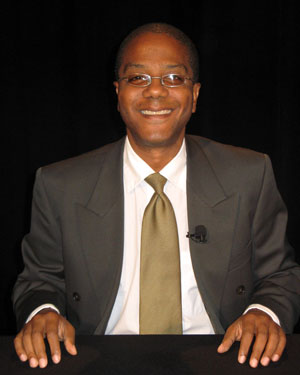
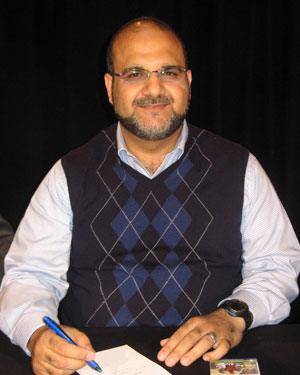
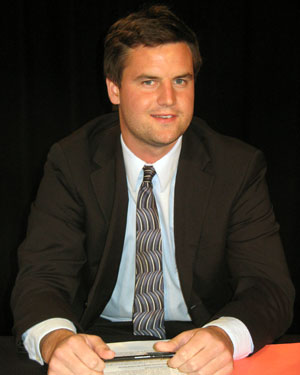

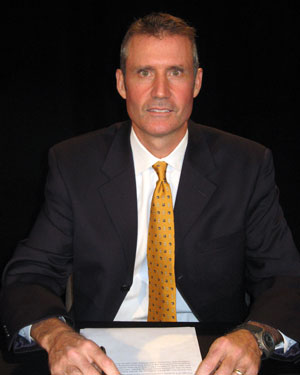
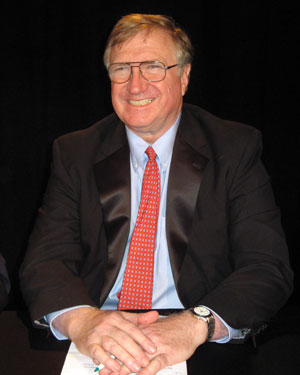
The more I hear from Ahmar Iqbal, the angrier I get. He has a Harvard Master’s in Public Policy and worked in Finance. For him to consistently repeat major factual errors (such as were pointed out in this article) that make the AAPS look unjustly bad strains his credibility. More and more I suspect he is deliberately perpetuating falsehoods to serve an agenda of killing public schools. When I’m feeling charitable, I allow that he may just really want the facts to line up with his ideology, and it makes him careless.
My feeling is that people who don’t believe in good government, don’t govern well. I’m not sure why he’s not trying to get involved in a private school instead of messing with the public school system.
I like Andy Thomas. He’s solidly helping the overall district performance.
I do wish the board would prioritize the needs of marginalized and low-income students for whom cutting busing impacts more. Simone Lightfoot has this perspective, but has been hampered by her somewhat combative manner.
Patrick Leonard seems very well intentioned but I’m not sure what he brings to the board.
I’m voting for Thomas, but I’m having trouble deciding between Lightfoot and Leonard.
Anyone have any advice?
I don’t like how these debates cover only policy rather than actual educational issues. The math curriculum and text books in Ann Arbor are horrible. We have middle school kids spending 30 minutes a day in an “advisory” class with no structure at all. Both Chinese and Latin were dropped from the language program at the last minute.
Yes, bus stops are important — I’m angry about that too — but the curriculum is even more important and yet it never seems to be discussed in public. The schools refuse to keep parents in the loop as to how classrooms are chosen — do they put advanced math students together? They won’t even discuss it.
Many of the teachers in Ann Arbor are great, but many seem overwhelmed this year with growing class sizes. Updating PowerSchool seems to be an afterthought for many and it’s difficult to catch problems until they’re too late.
ChrisW – I’m not sure everyone would agree with you about the math curriculum, or about middle school advisory (my family’s experience has been very positive), but that’s not really the point.
The school board is a policy-making body, with a focus on making sure our schools expend resources on the kinds of programming our community demands. They’re elected representatives of the community. They are not, and we should not expect them to be, experts on education or instruction. That’s why they hire a superintendent who is, who in turn hires administrators and teachers who can build a strong curriculum.
I agree that our schools should engage more with the community – but not because I feel they need micro-management. Today’s schools are a very demanding place for teachers and administrators, and very few people outside the field understand the many (sometimes conflicting) responsibilities put on educators by good practice as well as state and Federal law. We all need to have a more realistic understanding about what happens in our schools before we can make truly informed decisions about them.
EdgeWiseInAnnArbor – My vote is for Mr. Thomas and Mr. Leonard. I’ve enjoyed listening to Thomas during the forums and would like to give him more time on the board. Mr. Leonard has my vote because of his experience working in the AAPS and knowledge of the public education system. This would be a great duo.